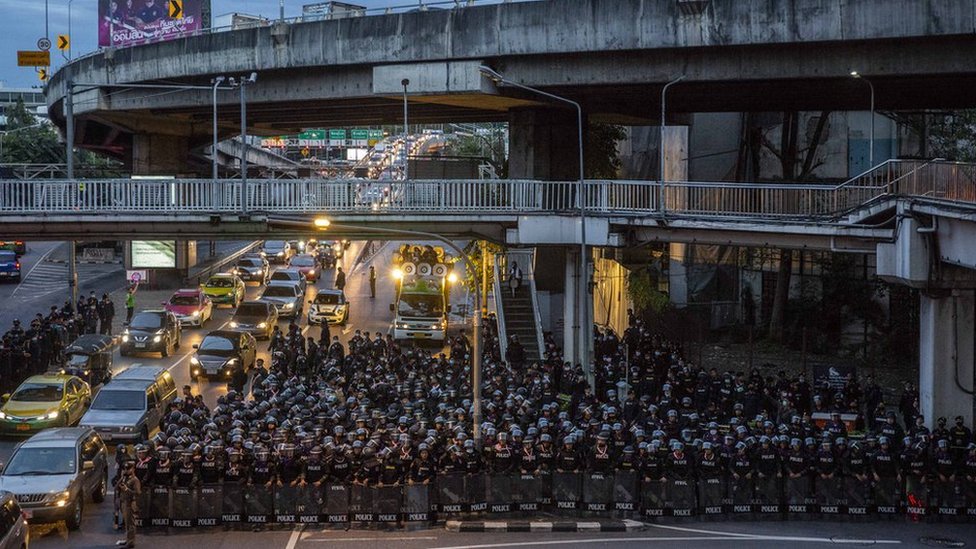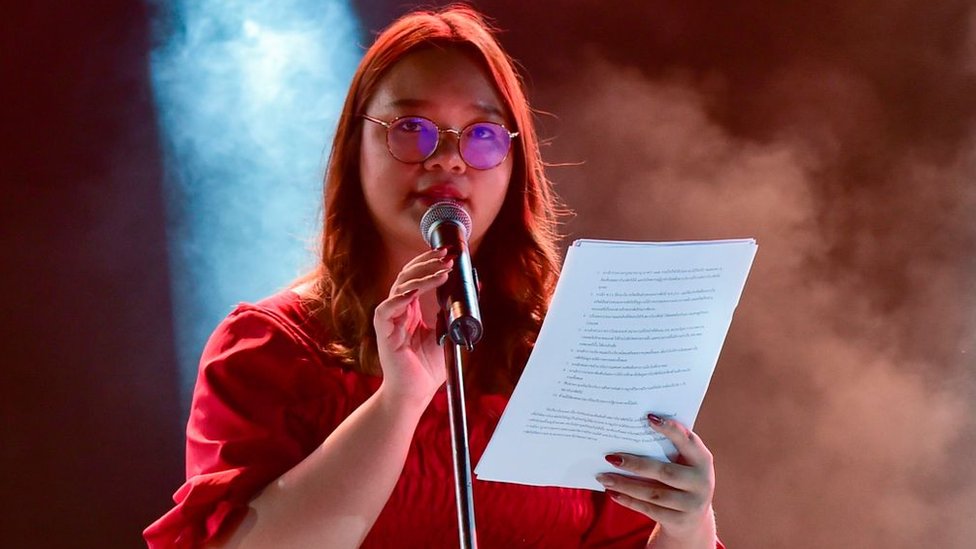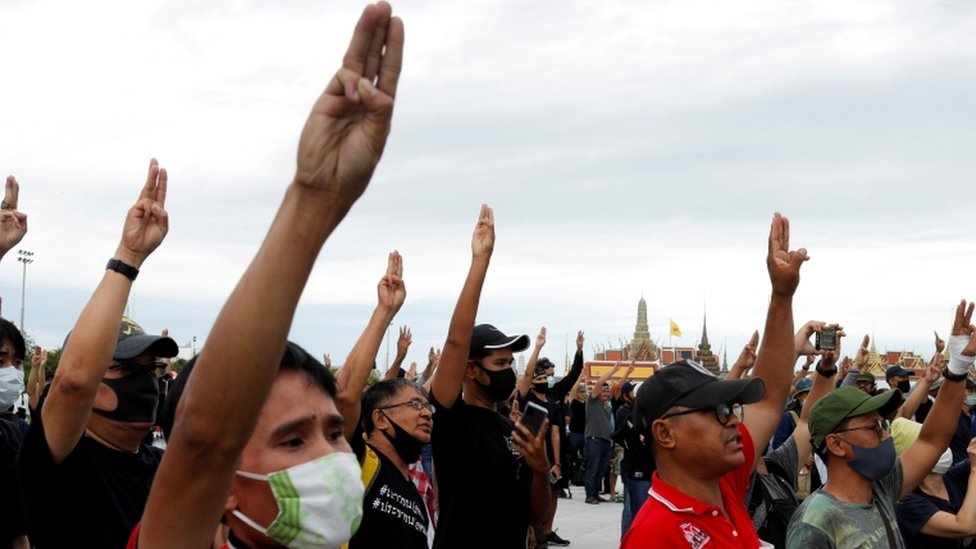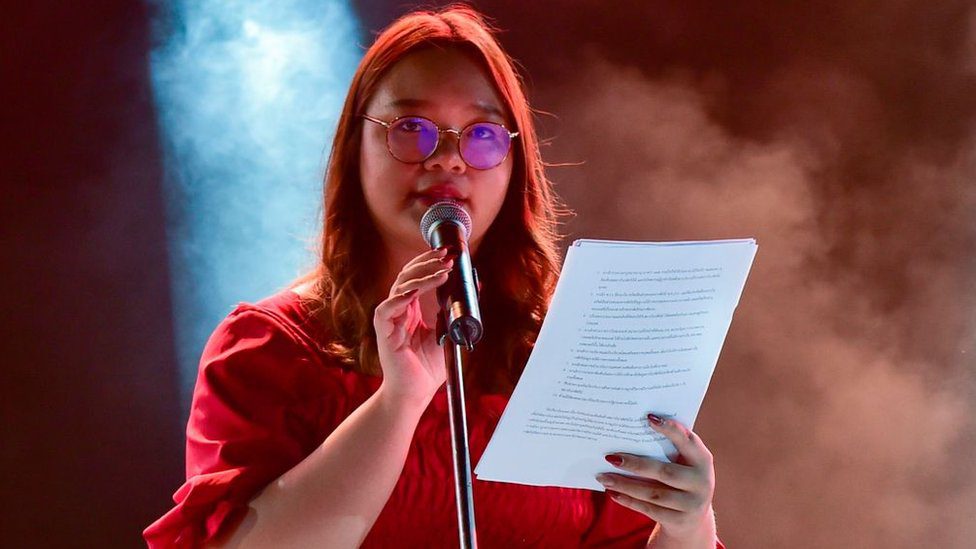Thailand has issued an emergency decree banning protests as it clamps down on largely peaceful pro-democracy rallies that have also targeted the monarchy.

In a televised announcement the government said urgent measures were needed to “maintain peace and order”.
It justified the orders partly on the grounds of some protesters disturbing a royal motorcade during a mass march in Bangkok on Wednesday.
More than 20 people have been arrested including three protest leaders.
Thailand’s student-led democracy movement has been calling for the resignation of Prime Minister Prayuth Chan-ocha. The former army chief had seized power in a 2014 coup before he was appointed as premier after controversial elections last year.
The protests have widened in recent months to also call for curbs on the king’s powers.

The emergency measures came into effect at 04:00 local time on Thursday (21:00 GMT on Wednesday).
What’s the new decree?
The decree, announced on state television overnight, said protesters had intended to instigate an incident leading to “chaos and incitement of conflict and public disorder”.
It cited the “obstruction to the royal motorcade” as one of the reasons for its imposition. Some protesters on Wednesday had raised the three-finger salute, a symbol of the movement, at a convoy carrying the queen as they were pushed back by ranks of police.
Shortly after the decree took effect, Thai riot police cleared protesters from outside the prime minister’s office. Some tried to resist, using makeshift barricades, but they were moved back.
Hundreds of police were seen on the streets even after protesters were dispersed.
In addition to limiting gatherings to four people, the decree puts restrictions on the media, prohibiting the publication of news “that could create fear or intentionally distort information, creating misunderstanding that will affect national security or peace and order”.
It also allows authorities to stop people from entering “any area they designate”.
How has the crackdown escalated?
Police said they arrested about 20 people starting in the early hours of Thursday, but did not confirm their names.
The BBC has learned that those arrested include three protest leaders – the human rights lawyer Anon Nampa, student activist Parit Chiwarak, widely known by his nickname “Penguin”, and Panusaya Sithijirawattanakul.
In a widely-watched livestream video police officers were seen reading out charges to Ms Panusaya in a hotel room. Another video showed police putting her into a car as she and her supporters chanted slogans.
Mr Anon, 36, was the first to openly break the taboo on discussing Thailand’s monarchy by calling for reforms in August. Ms Panusaya became one of the most prominent faces of the protests after she delivered a 10-point manifesto urging royal reform later that month.
Ms Panusaya, 21, had not been arrested until now, although the other two men have been arrested before – since the movement gained momentum in July.
Why are students protesting?
The growing student-led democracy movement has become the greatest challenge in years to Thailand’s ruling establishment.
Protesters are demanding the resignation of Mr Prayuth, following his election in the controversial 2019 polls. They also seek the rewriting of the constitution, whose amendments in recent years have been disputed, as well as an end to the harassment of state critics. Mr Prayuth rejects accusations the electoral laws were fixed in his favour.
Read Also: Thai Protests Thousands Gather In Bangkok As King Returns To Country
Since August, the calls for change have grown to include reform to the monarchy, sparking unprecedented public discussion of an institution long shielded from criticism by law.
There have been many protests against Mr Prayuth since the coup but a new wave of demonstrations began in February after a court ordered a fledgling pro-democracy opposition party to dissolve.

The Future Forward Party had proved wildly popular with young, first-time voters and garnered the third-largest share of parliamentary seats in the March 2019 election.
Protests were re-energised in June when prominent pro-democracy activist Wanchalearm Satsaksit went missing in Cambodia, where he had been in exile since the 2014 coup.
His whereabouts remain unknown and protesters accuse the Thai state of orchestrating his kidnapping – something the police and government have denied. Since July there have been regular student-led street protests.
Rallies in the capital over the weekend were some of the largest in years, with thousands defying authorities to gather and demand change.
The protesters’ calls for royal reform are particularly sensitive in Thailand, where criticism of the monarchy is punishable by long prison sentences.
